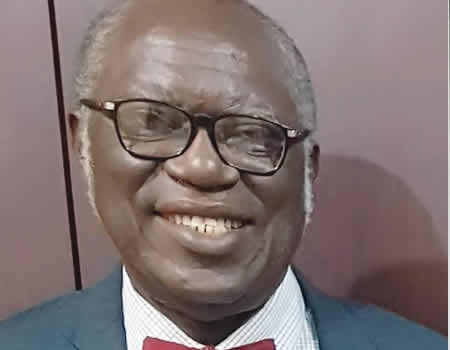Dr Gboyega Ajayi, the Chief Executive Officer of Eleta Eye Institute, Ibadan, has been in medical practice since 1973. He speaks to SADE OGUNTOLA on the argument surrounding the use of chloroquine for the treatment of coronavirus, and other salient issues.
Why has chloroquine, a drug that has existed for over 50 years, become controversial? President Trump is saying yes, some are saying no and others are in-between…
I don’t know why it became controversial. They disagreed with President Trump because he broke the rule. The rule is that before you use a medication for any condition, you should have tested it scientifically for that condition. But for emergencies, some rules must be broken. But if it has been said by a doctor rather than President Trump, there would have been no problem but because it came from a political leader who was going to the field of medicine, the professionals had to tell him, ‘you have no right to say that’. But the US is a funny place when it comes to medical treatment. There are some drugs used in Europe that you cannot use in the US because every drug must be tested in the US and certified usable and because of the legal implications. Doctors will run away from using a drug that they know is effective even if they believe in it. If it is used and it gets to the court, they will say is it licensed by FDA to use it, if it is not licensed, you are guilty, even if you had saved a patient.
Chloroquine, a commonly known antimalarial drug, is said to be useful in the treatment of coronavirus?
Choloquine is a medicine, of which use we have experience for over 50 years. It is related to quinine, which has been used for the treatment of malaria for years. It was derived from Cinchona bark.
We know all about its side effects and difficulties with its use and the drug has not been banned. What happened was that we reduced its usage because the malaria parasite, Anopheles falciparum, has become resistant to it. We had to look for other drugs to use for the treatment of malaria.
Now, for many years, Nigerian researchers have studied different strains of coronavirus. COVID-19 is caused by a variant of coronavirus that is also present in Nigeria. It is not a totally new virus. COVID-19 is an RNA virus; it is not like polio or HIV that is a DNA virus. So, it is easier to tackle it because it has a lipid cover that can be destroyed with soap, disinfectant or alcohol-based sanitiser. Chloroquine has been proved useful for years and there are tons of studies on the drug both in Nigeria and abroad. Yet, we are still waiting for somebody from outside Nigeria to tell us that it is useful in the control of COVID-19 pandemic.
There is no reason why we cannot start to use it without first carrying out clinical trials. It is an established drug; it is not a drug that has fallen out of favour. It is still being used for the treatment of conditions such as rheumatoid arthritis and amoebic abscess. Of course, the dose we are using for COVID-19 is even much lower than that for malaria, so what is the big deal? Moreover, there is an instance a drug developed for disease A is found later to be useful in the treatment of disease B successfully. It is the same case with chloroquine.
So, what are the studies, locally and internationally, backing up the use of chloroquine in the treatment of COVID-19?
In New York, a doctor published that he had treated over 699 patients with COVID 19 with chloroquine about three weeks ago. And he did not lose one single person, did not have to admit any person and none of them went into respiratory failure, so what are we waiting for? They are using it virtually all over in China. The beauty of chloroquine is that it is cheap; about a 1,000 tablets from the factory costs about N12,800. Those 1,000 tablets can treat over 30 people and for prevention, it can be used for far more people.
Coronavirus is a virus that can be passed from one person to another, meaning that if we can have people that the virus cannot pass through using chloroquine, we can break its spread or cycle in the society.
How about its toxicity?
People talk about the toxicity and I say toxicity my foot. In treatment, we ask: do its benefits outweigh its side effects? The rule is: do not make the patient worse. And chloroquine will not, except in those people that have overused it. I have published papers on excessive use of chloroquine. Even doctors have succumbed to the scourge of chloroquine overdose. It was taken it doses higher than necessary. Chloroquine is able to permeate every cell in the body, so if coronavirus is there, it allows the zinc to penetrate its cells to disintegrate it. So, it ends up destroyed. I believe that every health worker looking after patients should use it as prophylaxis. They just need to take two tablets of chloroquine, which is about 500 milligrammes, once in five days to have a reasonable level of chloroquine in their body for protection.
Now, we are told that two index cases, including the Italian who has been treated, are now COVID-19-negative. What was used to treat them, they are still holding as a secret rather than letting doctors know it. This is not the time you keep information, especially about treatment, to your chest, and more importantly, because we are talking about deaths due to COVID-19.
Why should they release information about the treatment?
The deaths from COVID-19 are not going to be our problem. Our problem is going to be deaths not related to COVID 19; deaths from hunger and starvation as well as diseases like diabetes, hypertension and cancer. Due to the diversion of attention from these diseases that are always with us, because all efforts are now focused on COVID 19, there will be a rise in the incidence of deaths from these conditions and that is what makes it more painful to me. We can easily give a subset of people chloroquine so that we can block the transmission but rather, we say we should do social distancing and partial lockdown. Fine, people now stay at home. But have we considered that this cannot work for us? For instance, looking at the speech of President [Muhammadu] Buhari, it said the ports would be opened so that goods could be coming in. Now, some people will have to go and collect those goods, and they have to be distributed. Someone said that there would also be a mobile market selling disposables and perishable items like tomatoes. That is fine, but it also shows a lack of understanding of the situation.
Have you considered the logistics that will be involved and that it is a formidable method to spread the virus? In a country where we cannot store food for long, where we do not manufacture anything but import everything, where we do not have water or electricity, how can we say we will lock people up in their houses?
It is okay for people in middle and high economic class, but for people that live from hand to mouth or that only buy cooked foods to eat, they will go out in their areas. The major streets may be empty but the corners wouldn’t be. That is where it matters the most because they are the most vulnerable people and because they will catch it, they end up spreading it to those that decide to stay indoors. So, there is a limit to which social distancing can help us to break the spread of the virus in Nigeria because of our style of living and the facilities that are available.
Now, I have asked myself some questions and they are pertinent. Influenza virus, a similar virus, is prevalent in Europe and America, especially in cold climate and people periodically have flu shots. That is not the practice here. I have never, as a doctor, been asked by a patient for flu shots, not even by people that have suffered severely from it in Nigeria.
If they are so many, I would have seen some of them. That means that our climate or something in our climate gives some immunity against influenza.
Also, one of the reasons is herd immunity. Between the time when the first contact case was discovered and now, we should have had a big insurgence or outbreak. It is suggestive of herd immunity. We have a number of people who have contracted it but did not react and they blocked the transmission to others.
In fact, those at UCH, Ibadan, as well as Governor Seyi Makinde are good case studies for epidemiologists. From area photography and videos of people who were in contact with them, we can mathematically calculate the number of people who could have come down with it within a time frame. If we don’t have that number, it means that there must be some elements of herd immunity that has prevented it. So, let’s be scientific and let’s use this science to stop COVID-19. Stopping it is important. We cannot afford ventilators, isolation and quarantine centres are not enough, and we cannot afford a standard ICU. Nigeria cannot even afford the tests kits. Even in the United States, they are fighting [President Donald] Trump for not making the kits available. Virtually all the European countries and USA still have to import from China, where the disease started. So, all the kits that are being used, even the face masks, are being imported from China.
But we can afford chloroquine. Two things: if it works, we save money and lives. If it does not work, we have not lost anything because it will not do any damage to anybody.
ALSO READ: Nigeria Likely To Record More Cases Of Coronavirus, NCDC Says
Are there precautions to take when one takes chloroquine?
In people with G6PD deficiency, a blood disorder, it may cause their red blood cells to break down, and so they may become anaemic. Anyway, by the time you take the first dose and you want to take the second dose, you will know whether you can tolerate it or not. So, it is not a big deal, apart from the itching. But people must not use non-steroidal anti-inflammatory (NSAIDs) such as ibuprofen because they cause more problems for patients with COVID-19. For pains and aches, it is better to just take paracetamol.
Can they take its injection?
The injection could be dangerous if it is used too frequently. So, I will advise that its injection be strictly used by doctors who know what they are doing. In the days that we used to see the toxicity of chloroquine, we saw more cases with injections, especially frequent injections with chloroquine.
Some reports indicate that chloroquine is combined with other drugs like antibiotics for treating COVID-19. Any need to also combine it with other medicines too also in Nigeria?
From the papers that I read, some doctors have used chloroquine or hydroxychloroquine solely and some with zinc supplements. But you do not need zinc supplement if you eat vegetables and fruits like pineapples and mangoes because they contain zinc. But if you are using chloroquine, it is good to also use multivite tablets and Vitamin C. Most multivitamins contain some appreciable amount of zinc. Vitamin C is very good and I recommend that everybody should take about 500 to 1000mgs of Vitamin C per day.
The antibiotics that they have touted only comes on when a patient has started having respiratory symptoms because there will be other bacterial infections. But if the patient is picked early and without any complication, chloroquine will take care of it solely with Vitamin C and multivitamin which contain zinc. And taking plenty of fluid to rehydrate is important as well and maintaining the normal hygienic procedures such as frequent hand and face washing. Because the virus could be in the throat for some time before going into the respiratory system, having warm saline gargle after going out will also be helpful.
How many times does one need to gargle in a day?
About two or three times a day or anytime you go out into the open or have discussions because it has now been found that one can take in aerosols as we are talking. It is also is good to use masks where necessary. And, of course, you have to pray.
WATCH TOP VIDEOS FROM NIGERIAN TRIBUNE TV
- Let’s Talk About SELF-AWARENESS
- Is Your Confidence Mistaken for Pride? Let’s talk about it
- Is Etiquette About Perfection…Or Just Not Being Rude?
- Top Psychologist Reveal 3 Signs You’re Struggling With Imposter Syndrome
- Do You Pick Up Work-Related Calls at Midnight or Never? Let’s Talk About Boundaries







